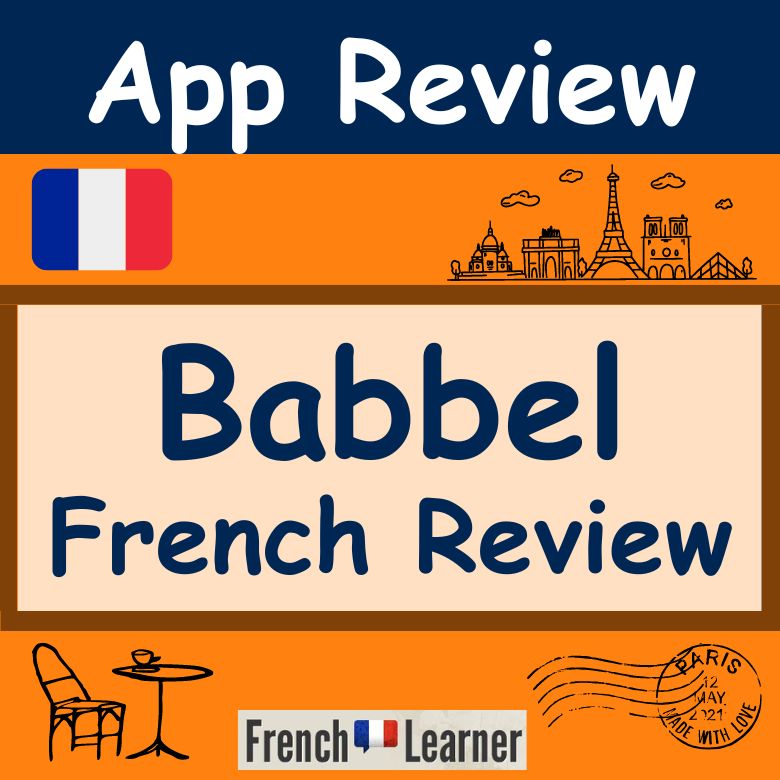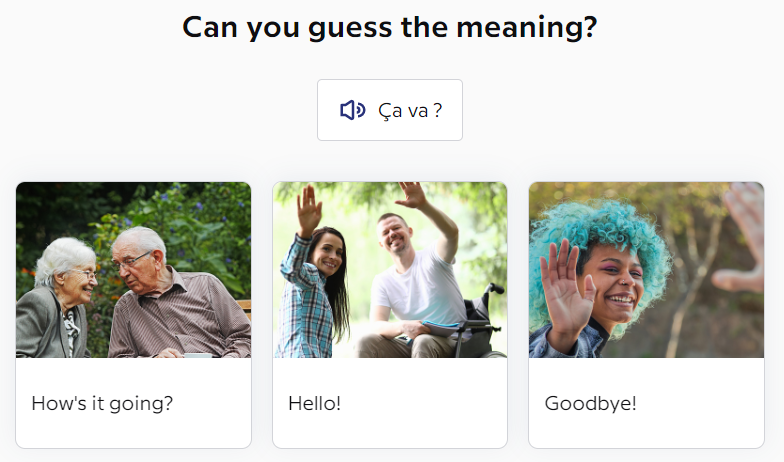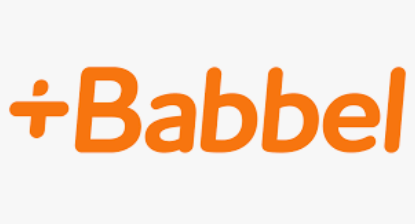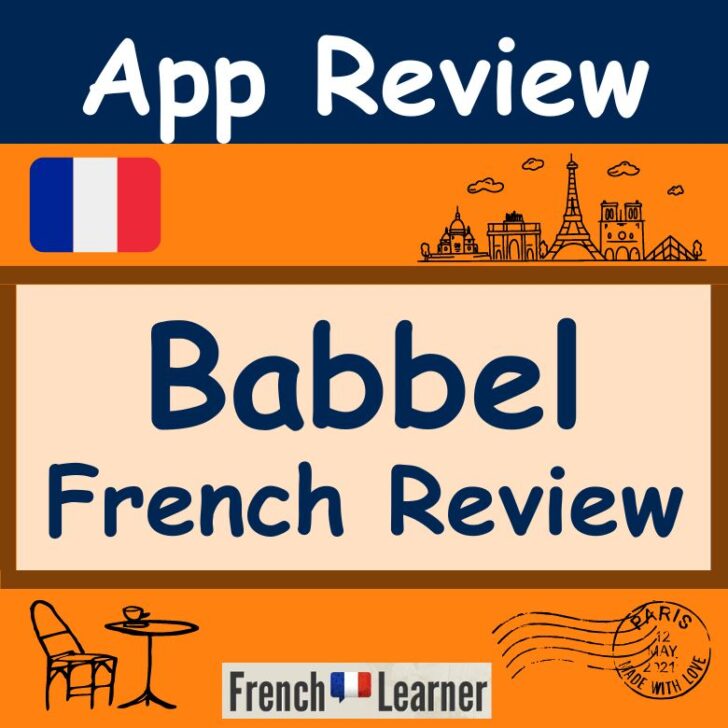If you’re looking for a flexible online platform to take your language learning to the next level, you’ve probably come across Babbel. Babbel is a hugely popular platform, with 50+ million downloads in Google Play alone. But it’s not free.
Before you whip your credit card out, you might want to read our considered Babbel review to see if it can teach you French. And see how it compares with other online learning platforms.

Babbel’s effectiveness
Let’s kick our review of Babbel language learning software off by answering the burning question: Can you really learn to speak French using their platform?
In our view, not really. However, Babbel French can help beginners and people who can’t commit to more time-intensive learning.
Babbel French might equip students with enough vocabulary to enjoy a vacation on the Côte d’Azur but won’t make you fluent enough to live in a French-speaking country.
This is true of all online learning platforms. But with 10+ million subscribers, they must be doing something right. We unpick the details as we move through our Babbel review.
The Babbel system
The Babbel system is refreshingly uncomplicated. Babbel assesses your current level, then sets bite-sized lessons and exercises to move you forward from your current level.
Once you’ve set daily learning goals, you only need to complete 10-15 minutes of daily lessons. As your language skills grow, difficulty levels ramp up.
Exercises rely upon spaced repetition and are formatted as speaking, listening, writing, and reading activities.
Unlike Duolingo, there are no glitzy prizes. You can see your progress clearly displayed in a clean dashboard.
Babbel doesn’t offer anything particularly unique. But they were pioneers of flexible online learning platforms and have found a formula that suits their subscribers. Since its founding in 2008, they have finessed their product for modern consumers.
Try Babbel! (60% off limited time offer!)
How does Babbel French work?
At its core, Babbel French relies on spaced repetition to hammer lessons home. All you need to do is pick the next recommended exercise or explore associated learnings.
It starts with a rudimentary self-assessment of your current level. This seems like a flawed method to measure your current level, although you can change your learning level if you need to recalibrate.
We were pleased to see the CEFR (Common European Framework of Reference) for Languages employed.
There’s a progress counter under “Achievements” and a section to track activity and set new goals.
In addition, you’ll see a button to “Review Now,” so you can go back over previous lessons.
Babbel exercises
Babbel French cuts out the noise and focuses squarely on interactive self-study exercises.

A daily 15-minute exercise concentrates on one topic with blended activities. For example, clothing introduces several words (vêtements, chaussures, pantalons, etc.) that are worked into multi-faceted lessons, each with a question to measure your understanding.
Image association, multiple choice questions, typing sentences, and speech recognition underpin activities.
Get a question wrong, Babbel will correct the error and let you move on. Mistakes will ultimately lead to similar questions being filtered into future lessons, aka spaced repetition.
At the end of the daily lesson, you can see your score and pat yourself on the back. This is not Duolingo, there are no cutesy animals to do the job.
You can redo lessons if a pat on the back is unmerited. Repeat learning is a welcome function, especially as you’re offered four types of revision to suit your learning style: flashcards, listening, speaking, and writing.
Babbel claims to carefully design courses without rehashing a series of flashcards. Yet, an occasional lack of imagination reveals itself.
Learners might be asked to spell “vêtements,” then say it, then use the word in a sentence. The line between reinforced repetition and tedious repletion is often crossed.
Offsetting the risk of tedium is the clever introduction of associated learning within exercises. You might learn informal and formal words, even colloquialisms, which are often overlooked on other platforms.
Even better, grammar and cultural insights are blended in. For example, a lesson will show how to ask for an item in several ways, such as mixing up pronouns (me vs. us) or plural vs. singular.
It’s a subtle yet intelligently designed approach to learning. It falls short of a skilled tutor but beats online methods that prioritize learning by rote.
While not perfect, Babbel French exercises are instructive and include plenty of speech recognition practice, which is always appreciated.

Babbel Live
Subscribers can join online classes with a certified tutor for a significant premium. This diminishes one of the primary drawbacks of language learning programs by allowing you to have genuine two-way conversations.
Online classes teach up to 6 learners. Learners enroll by competency (A2 or B1, for example.)
Valid criticisms from this Babbel review include a limited choice of sessions at convenient times and no option to pay per lesson.
Because you sign up for unlimited classes on a monthly or annual subscription, lessons can be expensive or cheap, depending on how many you take. You may find better value with an online tutor who fine-tunes lessons to your requirements.

Pros & cons of Babbel
As our Babbel review reveals, the platform is built on similar techniques found on other language platforms. A few features shine, and several could be improved.
What Babbel could improve
Uninspiring exercises – the biggest gripe we had — and many users according to other Babbel reviews— is that lessons overdo repetition. Forced repetition is a tried and tested method. But you’ll probably want the odd day off from saying the same thing in six different ways.
Limited advanced lessons – you’ll find fewer lessons at the intermediate and advanced levels. It’s a common fault of tools primarily targeted at beginners and casual learners. And a tacit admission that users will eventually look elsewhere for lessons. Hopefully, not before you’ve got the most out of your subscription.
Subscription system – A 12-month subscription is around half the price of monthly payments. You can get one free lesson, so a 12-month commitment is a big ask. A 20-day risk-free refund helps.
Try Babbel! (60% off limited time offer!)
What Babbel does well
Solid teaching techniques – Babbel gently blends complementary lessons into vocabulary lessons. Pop-ups explaining when to use the formal or informal are commendable.
Effective speech-recognition – a reassuringly high number of lessons are speech-recognition. This is a positive way to learn, and the oral exercises seem to work well (although not everyone agrees when reading other Babbel reviews.)
Real-life dialogues – there are native voices and almost realistic dialogues. Babbel French doesn’t assume people want to hear about your favorite sock color, like some other apps.
Enhanced user control – Babbel gradually guides users to their learning objectives, but also allows them to switch learning levels or topics. It might not be advisable to jump around, but it does let you shape your learning.
Babbel Live – it’s not cheap, and choices are limited. But Babbel Live solves one of the main failings of AI learning, the chance to speak with a human.
Spaced repetition – Babbel tracks mistakes through 6 learning stages. Answer correctly, and the lesson moves up and will be repeated less often. Get something wrong, and it moves down a stage, appearing more often. It’s a clever system to track your strengths and weaknesses.
Neutral
Clean, uncomplicated interface – we like it, but there isn’t much to do but complete your lessons on Babbel. Some will see this as a positive, while others will miss the animations egging you on. Hence the neutral rating, although the clarity is something we would generally applaud.
Can you speak French fluently with Babbel?
The short answer is no; Babbel French will not teach you to speak fluently.
We have explored the reasons in this Babbel review, but there’s no need to single out Babbel. If you want to reach B2 level or higher, no AI learning platform can beat tailored, immersive learning with live practice.
How much does Babbel cost? Is it worth paying?
Babbel offers monthly to annual subscriptions.
- 6 months – $7.20/month or $43.20
- 12 months $4.80/month or $57.60
- Lifetime $190.99 (best value)
To our eyes, that monthly fee is steep. Duolingo may not match the lesson quality, but it’s a broadly similar style of learning that doesn’t cost a cent.
The annual subscription, at half the monthly cost, is better value. But who wants to sign up for 12 months when there is a clear learning ceiling? Unless you’re an early-stage learner, it may not offer enough value.
Discounts are offered to students, healthcare workers, educators, and military personnel. Which is a nice touch.
Babbel Live lessons are a separate subscription for unlimited classes. However, ‘unlimited’ is limited by availability slots and class numbers (maximum of 6):
- $99 – 1 month
- $209 – 3 months
- $359 – 6 months
- $599 – 12 months
Live teaching with a certified tutor is the ultimate method of remote learning. A subscription can be good value if you sign up for enough lessons.
However, Babbel French recommends 4 monthly lessons for intense learning and one for casual learners. If you follow their recommendations, it may not be such a great deal.
Is Babbel better than Duolingo?
Babbel French has the edge over Duolingo French. Lessons are better structured, users have greater control over learning paths, and the clean interface keeps the focus on learning.
However, Duolingo is free if you forgo optional extras. If you want a more gamified approach to learning, Duolingo is streets ahead.
Check out our Duolingo review after this Babbel review.
Babbel vs. Rosetta Stone: Which is better?
We have previously written about the strengths of Rosetta Stone for new learners.
Overall, the two methods are comparable. Lots of images and associated exercises, with a healthy dose of speech recognition to sharpen speaking skills.
Rosetta Stone has been around since 1999, and their teaching follows a more traditional model. It can be more challenging at first but pushes users to stretch their learning with fewer leading questions.
Babbel holds your hand more than Rosetta Stone and offers less control over your learning program, as Rosetta Stone lets you access the full suite of lessons from the start.
Both deliver premium price live lessons, although Rosetta Stone also features the handy “Stories” function.
New learners will find both platforms educational, and prices are similar. Your preferred learning style will determine which is best for you.
How to access Babbel French
Babbel can be accessed on Android and iOS apps or on the website. The clean dashboard looks the same on all platforms and syncs seamlessly, so you can switch whenever you want.
Is there a Babbel podcast?
No serious learning platform ignores podcasts. Babbel also produces a ‘magazine’ and posts videos on YouTube.
Babbel podcasts can be accessed on Apple, Spotify, or the website. They last 10-15 minutes, are free to non-subscribers, and include transcripts. The recordings are helpful for learners who want to hear authentic voices and learn a little about their target culture.
The online magazine curates cultural snippets and mini-lessons, so it’s not particularly exciting.
YouTube videos are fun and presented by native speakers. But they are similar to hundreds of other language videos on YouTube.
Our Babbel review in a nutshell
Babbel is one of the big fish in the language learning pond. It doesn’t distinguish itself from other platforms in any significant way, sitting somewhere between the flashy gamified Duolingo method and the immersive yet conventional methods of Rosetta Stone.
Overall, Babbel delivers balanced exercises, a clean interface, and a flexible approach to learning.
But as we’ve seen in this Babbel review, there is a ceiling that prevents users from moving beyond the basics.
Babbel French is hamstrung by the usual limitations of AI teaching: forced repetition can be monotonous, and speech-recognition exercises are inferior to real-world practice.
If you’re a beginner, Babbel French might spark a growing interest in learning more. If you’ve moved beyond the beginner stage, there is limited value, and there might be better ways to spend the money.
Try Babbel! (60% off limited time offer!)

